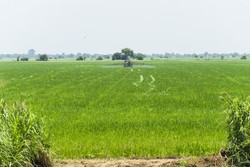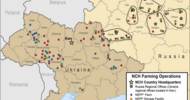
Many plans for foreign investment in large plantations in East Africa have failed. Picture from Agricas rice plantation. (Photo: Cheryl-Samantha Owen / Greenpeace)
Norfund lost NOK 146 million on a plantation in Tanzania
By Asle Olav Rønning
(Translation by GRAIN. See the original here)
It started as a government collaboration between Tanzania and North Korea on large-scale rice production in the 1980s, but the plans were never completed. In 2008, the Guernsey-registered company Agrica took over the Mngeta farm in the Kilombero Valley in the central part of Tanzania. Now it was international investors in collaboration with development aid money who were to ensure modern rice production on a large scale.
(Translation by GRAIN. See the original here)
It started as a government collaboration between Tanzania and North Korea on large-scale rice production in the 1980s, but the plans were never completed. In 2008, the Guernsey-registered company Agrica took over the Mngeta farm in the Kilombero Valley in the central part of Tanzania. Now it was international investors in collaboration with development aid money who were to ensure modern rice production on a large scale.
The plantation is more than 5,000 hectares, two hundred times larger than an average Norwegian farm. Agrica has operated the plantation through its subsidiary Kilombero Plantations Limited (KPL).
Norfund invested in Agrica in 2010, and then increased its investment and provided loans. The last financial guarantee was given in 2017. Norfund owned 26.9 percent of the company when it shut down in 2019.
It was long known that the plantation was struggling financially, as can be seen in the final bill for Norfund's part. Norfund's losses are divided between $13.4 million in investments and $10 million in loans and guarantees.
A Tanzanian bank, NMB, currently manages the farm. Norfund informed Bistandsaktuelt that the fund has now completely exited the company, and will not participate in attempts to establish new operations at the rice plantation.
The extent of the loss in Agrica appeared partly in Norfund's 2019 accounts, and partly in the 2020 accounts which have not yet been presented. Norfund states that they have no outstanding claims in the company. It says there are no suspicions that fraud occurred in the process.
Supported by development assistance funds
In addition to Norfund and private investors, the company was also supported by development actors, such as the UK equivalent of Norad, DFID, and USAID of the US.
The plantation is also one of the few foreign investments linked to the Norwegian-supported Southern Growth Corridor of Tanzania (SAGCOT), an ambitious plan to attract investment to agriculture. SAGCOT was launched by then President Jakaya Kikwete at the World Economic Forum in Davos in 2011.
According to Bistandsaktuelt, Agrica has never been profitable, and has struggled with floods, droughts and unstable market prices for rice in Tanzania. Part of the production was to take place through contracts with small farmers, but here there were disagreements about prices.
Norfund's investment has been controversial. See also reader contributions in Bistandsaktuelt here. Criticism has been leveled at the way the company handled land rights and what compensation was given to those who lived on the plantation before production began. Agrica has rejected the criticism and a report from Norad's evaluation department in 2018 did not find evidence of such issues.
Many have failed
Agrica's project is one of many large-scale agricultural projects in East Africa, in which aid funds have contributed, and where the results have not been in line with expectations. In the last two decades, many millions of dollars in aid have flowed into such projects, but the results have often been disappointing.
"In 2003, there were plans in Tanzania for investments in 35 large-scale plantations of more than 2000 hectares. Of these, there are really only a couple of projects that have any business today, and on a much smaller scale than planned," says Linda Engström, researcher at the Swedish University of Agricultural Sciences.
Engström says that there was great interest in investing in large-scale agriculture in East Africa in the early 2000s. Part of the reason was the expectations of high demand for biofuels based on sugar cane. Another factor was the sharp rise in international food prices, which made land an attractive investment.
Inspiration came from Brazil's great success as a large - scale exporter of agricultural raw materials. The green revolution and the desire to adopt new and more efficient cultivation techniques were also important. Many of the commercial projects received support from Western development actors.
"In development funding, cooperation with the private sector became very important, in combination with the desire to contribute to poverty reduction," says Engström.
Today, that enthusiasm for large-scale agricultural production is significantly subdued. Some, like Agrica, have lost a lot of money. Norad had also lost a lot of money on an earlier investment. As previously reported by Bistandsaktuelt, in 2014 Norfund lost NOK 173 million on the banana plantation Matanuska in Mozambique.
Norfund is not alone. Sweden's Sida will probably lose money on guarantees given to a Swedish company (see below) that would start extensive biodiesel production based on sugar cane plantations in Tanzania. The Times reported last week that the British equivalent of Norfund, CDC, has invested 76 million dollars (638 million kroner at today's exchange rate) in a Canadian palm oil company in DR Congo, which is now bankrupt. The CDC is set to lose the entire investment.
The solution is no longer with large-scale
Many large-scale agricultural projects in East Africa never got off the drawing board, says Engström. She believes that the climate is different today when it comes to agricultural investment.
"There are very few of the grand projects. I think that today people talk about agricultural development in Africa in a different way than before and that large-scale agriculture is no longer emphasized as the solution. The reason is probably that it has not gone so well," says Engström.
Other models for agricultural development may be about to take over. Engström says that medium-sized businesses, up to a couple of hundred hectares in size, show signs of being more successful. These farms are often owned by enterprising farmers or domestic investors.
Such farms are more flexible and can be combined with different types of production at the same time. They require less area of cultivated land, which reduces the risk of conflicts over land.
Believes investors have lacked knowledge
Engström believes that there are several reasons why large-scale operations in East Africa have often failed over the past two decades.
"The plans have often been too simple and based on a lack of knowledge about local conditions. Foreign companies often lack local knowledge and access to networks," she says.
The researcher adds that it was initially believed that there was a lot of uncultivated land in the region, but that this was in many cases wrong. Much of the land is under the administration of the villages, and these have their own hopes and expectations about what the areas can be used for.
"Land is politics, land is power and land is money. Land is also the small farmers' security for survival," says Engström.
Norfund no longer invests in plantations
British businessman Carter Coleman, who with a background as a journalist and environmentalist started Agrica, said in an email to Bistandsaktuelt that he hopes new owners can take over the operations, and that this will be easier if they do not have to go into a lot of debt. Coleman says he will have no role in the operation of the plantation in the future.
He states that the bank held an auction round with interested parties in October last year. The Norwegian Embassy in Tanzania, which supports the SAGCOT initiative financially, is also aware of the situation. It states that the bank will have contact with several potential buyers who may be interested in taking over the operation.
Norfund already changed its strategy several years ago, and no longer makes new investments directly in plantations. Instead, the focus is on companies that process and are higher up in the value chain for agricultural products.
Ellen Cathrine Rasmussen, who is head of the department for high-growth businesses in Norfund, says in an email that there were many reasons why Agrica did not succeed. She points to extreme floods two years in a row, droughts, insect infestations, a policy for rice imports that was bad for profitability and a generally poorer investment climate in Tanzania.
Norfund also states in its email that they now see that their partners lacked sufficient experience in similar projects, not least in the rice sector.












